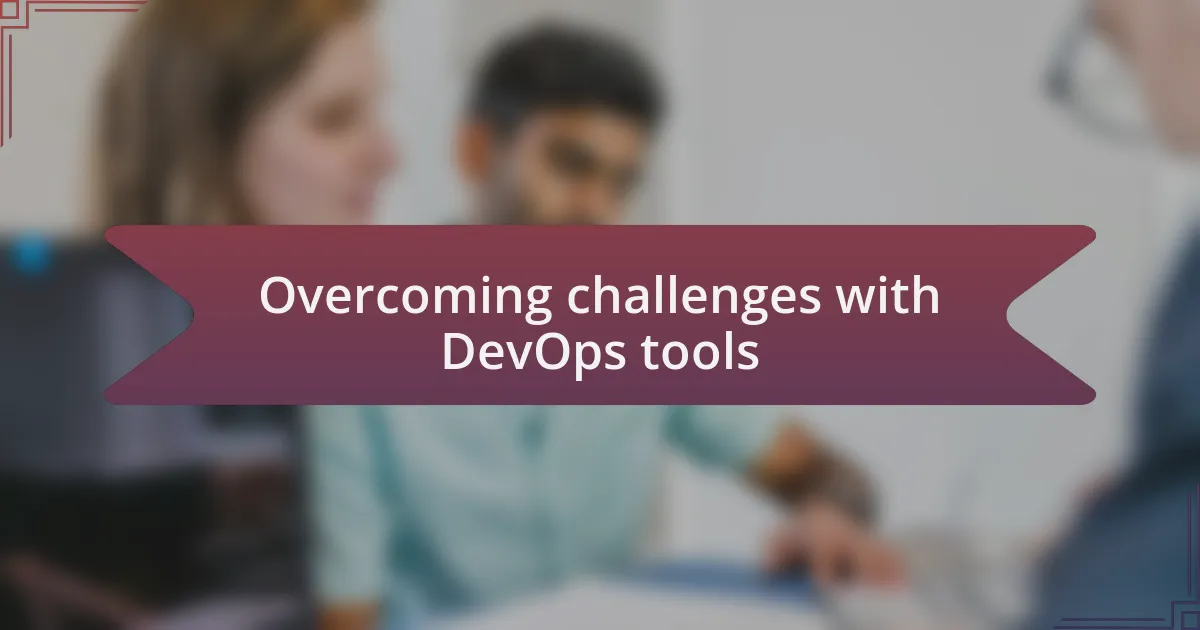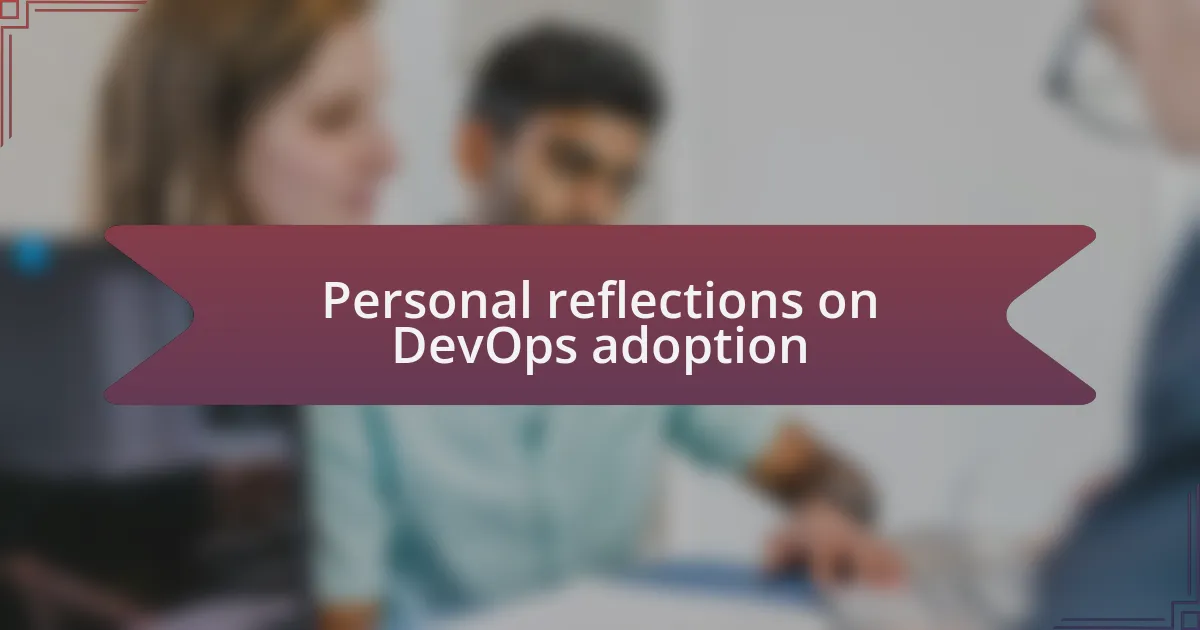Key takeaways:
- Effective DevOps tools enhance communication and collaboration, breaking down silos between development and operations teams.
- Continuous feedback and adaptability are vital for improvement and innovation during the implementation of DevOps.
- Cultivating a culture of ownership and accountability leads to deeper connections among team members and improved project outcomes.
- Addressing resistance to new tools requires patience, understanding, and the sharing of success stories to foster enthusiasm within the team.

Understanding DevOps tools
DevOps tools are designed to facilitate communication and collaboration between development and operations teams. When I first encountered these tools, I was struck by how they foster an environment of shared responsibility. It made me wonder, how can so much divide be bridged simply through better communication methods?
I remember working late one evening, brainstorming on a project with my team. We decided to implement a continuous integration tool, and the shift was palpable. Suddenly, instead of working in silos, we were iterating our ideas, catching errors earlier, and achieving smoother rollouts together. This experience highlighted how essential these tools are in creating a cohesive workflow.
Understanding the landscape of DevOps tools can be overwhelming—there are so many options available. I often ask myself, how do I determine which tool is best for my specific needs? Sharing insights with peers can be invaluable, as we all have unique experiences, and these discussions can often illuminate the path forward. It’s about finding the right blend that aligns with your team’s culture and goals.

Enhancing collaboration in development teams
When we shifted to using collaboration tools like Slack and JIRA, I noticed a remarkable uptick in our team’s communication. It was almost like flipping a switch—the barriers that once seemed insurmountable began to dissolve. I remember logging in one morning to find a robust discussion already underway; having diverse perspectives contributing in real-time felt invigorating. How could we have functioned without this constant exchange of ideas before?
There were times when I felt isolated while working on a particularly challenging module. But with the implementation of automated deployment pipelines, I gained visibility into others’ workflows. Seeing how my code fit into the larger picture made me feel more connected to the team’s goals, reinforcing our shared purpose. It raised a question for me: how can we prioritize transparency to deepen our collaborative spirit?
Reflecting on my journey, I realize that utilizing DevOps tools is more than just technical integration; it’s about embedding a mindset of collaboration in the team. I fondly recall a project where we collectively celebrated each milestone, big or small, thanks to clearly shared progress updates. These moments reminded me that our unity in teamwork, bolstered by effective tools, truly drives the success of our development efforts.

Lessons learned from implementing DevOps
One of the most significant lessons I learned from implementing DevOps is the importance of continuous feedback. During our transition, I remember a moment when a developer pointed out a minor issue during a code review, which sparked a discussion that led to a major improvement in our application’s user interface. I realized that fostering an environment where everyone felt comfortable sharing insights not only improved our product but also strengthened our team dynamic. How often do we overlook the power of a simple conversation?
Another key takeaway for me was the need for adaptability. In those early days of implementing new automation tools, I often found myself frustrated as we encountered unforeseen glitches. But over time, I learned that embracing these challenges meant we could innovate faster. It was a reminder that our willingness to adapt and learn from mistakes is what sets successful teams apart. Have you ever found that your greatest enhancements came from the most unexpected setbacks?
Lastly, I recognized that adopting DevOps tools wasn’t just about operational efficiency; it transformed our mindset towards ownership and accountability. I recall a project where one individual stepped up to take charge of the deployment process, and this sense of ownership ignited a collective responsibility within the team. The shift from seeing tasks as individual assignments to collective ownership was refreshing and engaging. How does embracing accountability shape the outcomes of your projects?

Overcoming challenges with DevOps tools
When it comes to overcoming challenges with DevOps tools, communication played a crucial role in our journey. I vividly recall a particularly tense sprint review where misunderstandings around tool usage led to fragmented collaboration. By openly discussing our struggles, we not only clarified our expectations but also built deeper connections among team members. Have you ever noticed how a simple conversation can dissolve barriers?
Another challenge I faced involved integrating various DevOps tools seamlessly into our workflow. Initially, I felt overwhelmed by the complexity of toolchains and automation scripts that seemed to multiply the issues rather than solve them. However, as I began to tackle one tool at a time with focused efforts, my confidence grew. I realized that patience and incremental progress can turn chaos into order. Don’t you think that sometimes taking smaller steps creates a clearer path?
Moreover, we encountered resistance from team members who were hesitant to adopt new processes. I remember feeling disheartened by their reluctance, as I fully believed in the potential of DevOps tools. However, by sharing success stories from early adopters within the team and organizing training sessions that emphasized hands-on experience, I slowly saw skepticism turn into enthusiasm. This experience highlighted for me the importance of fostering a culture of understanding and support when implementing new methodologies. How have you approached similar resistance in your projects?

Personal reflections on DevOps adoption
Adopting DevOps tools was like embarking on a journey where every twist revealed something new about my work habits. I distinctly remember the moment when I realized that collaboration wasn’t just about shared tools but about aligning visions and goals. Have you ever felt that rush of clarity when everyone is on the same page? It made me appreciate the deeper impact of technology on teamwork beyond just the technical aspects.
I found that hands-on experience was paramount in easing my learning curve with these tools. There was a moment during a late-night deployment when a bug caused chaos, and I felt my heart race as I navigated through logs and error messages. It was stressful, yet exhilarating to fix it by applying what I had learned about monitoring tools. That incident reinforced my belief that real-world challenges are the best teachers. Isn’t it fascinating how pressure can propel us to greater understanding?
Reflecting on the journey, I recognize the emotional rollercoaster of embracing DevOps principles. There were times of frustration, like when I struggled to automate a simple task that should have been straightforward. Yet, those moments were pivotal. They taught me resilience and encouraged me to seek advice from my peers, fostering a sense of community. Have you ever felt unmotivated only to find that the support around you can reignite your enthusiasm? It’s this shared journey that transforms not just our outcomes but also our professional identities.